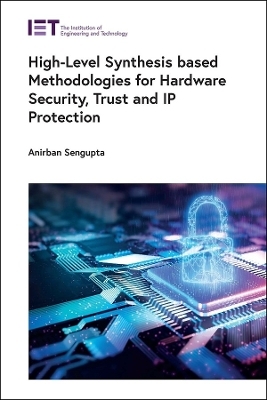
High-Level Synthesis based Methodologies for Hardware Security, Trust and IP Protection
Institution of Engineering and Technology (Verlag)
978-1-83724-117-0 (ISBN)
High-Level Synthesis based Methodologies for Hardware Security, Trust and IP Protection presents state-of-the art high-level synthesis methodologies for hardware security and trust, including IP protection through synthesis-based watermarking and structural obfuscation.
All modern electronic gadgets have complex system-on-chips (SoCs) that rely heavily on data intensive application specific processors, for digital signal processing (DSP), machine learning, and image processing applications. These data-intensive cores, in the form of intellectual property (IP), form an integral part of various modern equipment and consumer applications, such as smart phones, smart watches, and tablets.
High level synthesis (HLS) frameworks play a pivotal role in designing these application specific processors. However, the design of such processors can be exposed to several trust issues and hardware security threats, such as IP piracy, fraud IP ownership, and reverse engineering.
Written by an expert author, this book is a source of information for readers on HLS solutions for hardware security. It covers topics such as HLS-based watermarking using retinal biometrics, HLS-based structural obfuscation, and detective countermeasure against HLS-based hardware Trojan attacks.
This book is a useful resource for researchers, graduate students, and practising engineers working in electronics and chip design.
Anirban Sengupta is a full professor in the Department of Computer Science and Engineering at the Indian Institute of Technology (IIT) Indore, India. He has more than 300 publications and patents, including 6 books, to his credit. He is the recipient of awards and honors such as fellow of IET, fellow of British Computer Society, fellow of IETE, IEEE Chester Sall Memorial Consumer Electronics Award, IEEE distinguished lecturer, IEEE distinguished visitor, IEEE CESoc Outstanding Editor Award, IEEE CESoc Best Research Award from CEM, Best Research paper Award in IEEE ICCE 2019, IEEE Computer Society TCVLSI Outstanding Editor Award, and IEEE TCVLSI Best Paper Award in IEEE iNIS 2017. He held or holds around 18 editorial positions in IEEE and IET journal boards. He is consistently ranked in Stanford University's Top 2% Scientists globally. Details available at: http://www.anirban-sengupta.com/index.php.
Chapter 1: Introduction to hardware security and trust and high-level synthesis
Chapter 2: High-level synthesis-based watermarking using protein molecular biometric with facial biometric encryption
Chapter 3: High-level synthesis-based watermarking using retinal biometrics
Chapter 4: HLS-based mathematical watermarks for hardware security and trust
Chapter 5: High-level synthesis-based watermarking using multimodal biometric
Chapter 6: High-level synthesis-based watermarking using crypto-chain signature framework
Chapter 7: HLS-based fingerprinting
Chapter 8: Hardware obfuscation-high level synthesis-based structural obfuscation for hardware security and trust
Chapter 9: Hardware obfuscation-algorithmic transformation-based obfuscation for secure floorplan-driven high-level synthesis
Chapter 10: Fundamentals on HLS-based hardware Trojan
Chapter 11: Hardware Trojans - detective countermeasure against HLS-based hardware Trojan attack
Chapter 12: Conclusion
| Erscheinungsdatum | 03.09.2024 |
|---|---|
| Reihe/Serie | Materials, Circuits and Devices |
| Verlagsort | Stevenage |
| Sprache | englisch |
| Maße | 156 x 234 mm |
| Themenwelt | Informatik ► Netzwerke ► Sicherheit / Firewall |
| Informatik ► Weitere Themen ► Hardware | |
| Technik ► Elektrotechnik / Energietechnik | |
| ISBN-10 | 1-83724-117-1 / 1837241171 |
| ISBN-13 | 978-1-83724-117-0 / 9781837241170 |
| Zustand | Neuware |
| Informationen gemäß Produktsicherheitsverordnung (GPSR) | |
| Haben Sie eine Frage zum Produkt? |
aus dem Bereich


